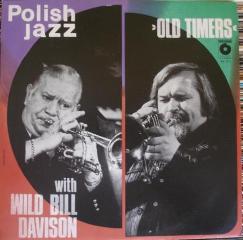Old Timers with Wild Bill Davison (Polish Jazz 57) [1978]
Old Timers with Wild Bill Davison (Polish Jazz 57) [1978]

A1 Feetgety Feet 4:53 A2 I Can't Give You Anything But Love 4:03 A3 Beale Street Blues 3:45 play A4 I'm Confessin' 3:53 A5 Running Wild 4:15 B1 China Boy 4:00 B2 Sugar 5:52 B3 Riverboat Shuffle 4:20 play B4 Louisiana 6:02 Credits: Banjo, Guitar – Henryk Stefański Bass – Jerzy Stawarz Clarinet – Janusz Kwiecień, Ryszard Lipiec (tracks: A5, B1) Cornet – Wild Bill Davison Drums – Tadeusz Fedorowski Piano – Tomasz Ochalski Trombone – Zbigniew Konopczyński Trumpet – Henryk Majewski Polish Radio recordings: A-5, B-1 - January 1976 others - January 1978
Dobrze się stało, że wsród odwiedzających ostatnio Europę „starych mistrzów znalazł się także William „Wild Bill” Davisom. Pozwoliło to plejadzie czołowych europejskich tradycjonalistów na konfrontacji tego co grają z kimś kto należy do twórców muzyki określanej jako „dixieland”, „Clii cago” czy „styl condonowski” - mniejsza o definicję. Davison, który jest znany z tego że lubi grać i nagrywać z przypadkowym grupami (stawia jeden warunek: musza to być dobrzy muzycy) nagrał w ostatnich latach ponad setkę płyt z Europejczykami. Obecność Davisona jest w tych nagraniach zawsze słyszalna nawet gdy sam mistrz nie gra inni grają z reguły najlepiej jak potrafią; dotyczy to zarówno solistów jak i całych zespołów, I tak też jest w przypadku tej płyty. Charakterystyczne brzmienie, zmienność nastrojów i precyzja „Old Timersów” został wyeksponowane dzięki niezawodnemu wyczuciu Davisona, który nie stara się być gwiazdą, jest partnerem. Cała płyta ma coś z nastroju jam session. „Wild Bill” dzieli się z Henrykiem Majewskim solówkami a ich „przekomarzanie” się jest w kilku przypadkach najwyższej jazzowej marki (np. w Riverboat Shuffle). W grze „Timersów”ujawnia się bardzo specyficzny, a niestety rzadko u nas słyszany „amerykański” drive. Z Davisonem inaczej grać się nie da. Pochwalić zatem należy sekcję rytmiczną za ten swing, leadera za doskonale solówki i inteligentne aranże. Zbigniewa Konopczyńskiego za brookmeyerowskie niemal solówki w Beal Street Blues i Sugar, Guglowskiego za smak i elegancję a „Wilda Billa” Davisona za to że do nas zawitał a dzięki tej płycie zagościł u nas w domach.
Mimo swoich 74 lat jest muzykiem nad zwyczaj aktywnym. Dlaczego? Ponieważ jak sam mówi: „Lubię grać jazz a przez całe życie robiłem to co lubię”. Bechet powiedział kiedyś: „Jazz to nie jest rodzaj muzyki, to styl życia”, l „Wild Bill” to udowadnia. W jego grze można usłyszeć jednocześnie liryzm i zadziorność, eksplozje w górnych rejestrach i gniewne „growle w dole, ekspansywne frazowanie i melodyjność. .Wszystko to składa się na obraz muzyki bardzo osobistej, stanowiącej odbicie jego niespokojnego a jednocześnie łagodnego i jakże bardzo męskiego charakteru.
It is a good thing that among the “old masters” visiting recently Europe there has also been William “Wild Bill” Davison. The leading European traditionalists had thus an opportunity of confronting their playing with that of somebody who is one of the creators of the music described as “Dixie Land”, “Chicago” or “Condon’s style” though its name does not matter. Davison, who is known for his readiness to play and record with fortuitous bands (on the condition they are good musicians), has made in recent years over one hundred records with Europeans.
The presence of Davison can always be heard in these recordings, even if he himself does not play - others are trying to play at their best, both the soloists and groups as a whole. This must be said also of this recording. The characteristic sound, changing moods and precision of the “Old Timers” are here fully exhibited owing to the unfailing sense of Davison who is’ not trying to be a star, being simply a partner. There is indeed an air of jam session about this record. “Wild Bill” is sharing the solos with Henryk Majewski and their “exchanges” are in some cases of the highest jazz order (e.g. in the River-boat Shuffle). A truly American drive, a rare quality alas with our bands, has this time manifested itself in the “Timers” playing. Indeed it is impossible to play otherwise with Davison. So one must praise the rhythm section for their swing, the leader for his excellent solos and intelligent arrangements, Zbigniew Konopczyński for his almost Brookmeyerian solos in the Beale Street Blues and Sugar, Guglowski for his taste and elegance, and “Wild Bill” Davison for his coming to us and, owing to this record, being present in our homes.
In spite of being seventy four he is still an extremely active musician. Why? Because, as he says himself “l like playing jazz and l have always done in my life what l like”. Bechet said once: “Jazz is not a kind of music, it is a style of life”. And “Wild Bill” has been demonstrating it. One can hear in his playing at once lyricism and perkiness, explosions in upper registers and angry growls at the bottom, expansive phrasing and melodiousness. Ali this contributes to making the music very personal, reflecting the player’s character which is both restless and gentle, and how very virile. ---Transl. L. Wiewiórkowski
download (mp3 @320 kbs):
uploaded yandex 4shared mega mediafire solidfiles zalivalka cloudmailru oboom
Zmieniony (Niedziela, 01 Marzec 2015 14:40)








